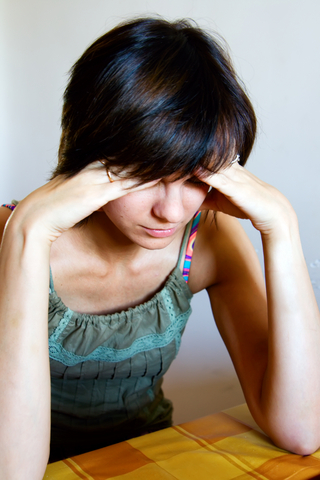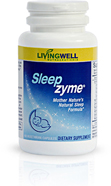 Are you constantly asking yourself … “Why am I always tired?”
Are you constantly asking yourself … “Why am I always tired?”
You get plenty of sleep, yet your energy levels are drained and you’re always fighting off feelings of fatigue…
If this describes you, you’re in good, albeit bleary-eyed, company, as millions of Americans report feeling tired every day.
What’s really going on?
First, Rule Out the Obvious 3…
1. Food
What’s your diet like? Are you trying to get by on energy-zapping foods like sugar and refined carbs? Drinking too much alcohol or coffee (which will only give you a short-term boost, followed by a crash)? Or are you not eating much at all? Try adding more whole foods like nuts, vegetables, eggs and lean proteins to your diet, and eat a little something with protein, carbs and healthy fats (like peanut butter on whole-grain crackers or a half of a turkey sandwich) every few hours, and see if your energy improves.
Also, be sure you’re drinking enough water, as even mild dehydration can zap your energy.
2. Stress
Stress from financial worries, relationship problems, health concerns or work demands can leave you feeling exhausted. The longer stress continues, the greater toll it’ll take on you physically, so it’s important to take time to de-stress and unwind.
3. Lack of Exercise
Though exercise requires physical effort, it pays off in more energy both in the long run and shortly after your workout. A quick jog or even a brief 4-minute workout will leave you feeling energized. And research shows that regular exercisers are less fatigued than those who are sedentary.
One caveat: be sure you don’t exercise too close to bedtime, as your body needs time to unwind for sleep (wrap up your workout at least three hours before you plan to go to sleep). Also, avoid frequent over-exercise, which can lead to fatigue.
Next, 9 Health Issues You Should Know About…
If you’ve ruled out the three factors above, and you’re still feeling perpetually tired, there may be a medical reason to blame. Talk with a healthcare practitioner to find out if your fatigue could be the result of one of these conditions:
1. Thyroid Problems: Both hypothyroidism (underactive thyroid) and hyperthyroidism (overactive thyroid) can result in fatigue. In the case of hypothyroidism, it’s common to feel exhausted after a full night’s sleep (or even with more sleep than normal). With hyperthyroidism, fatigue may be due to insomnia (another symptom of the condition) or bodily stress caused by the disease (which can lead to rapid pulse, tremors, high blood pressure and more).
2. Sleep Apnea: This common condition causes you to wake up multiple times during the night because your airways become blocked. You probably won’t remember these frequent awakenings in the morning, but they are a major contributor to daytime sleepiness and fatigue. Many with sleep apnea are unaware they have the condition (which is often accompanied by heavy snoring), but if you suspect you might it’s worth getting checked out.
Studies show that a simple treatment of continuous positive airway pressure (CPAP) therapy during sleep (basically wearing a mask that sends a stream of air down your throat to keep your airways open) can help sleep apnea patients regain energy and feel less fatigued.[i]
3. Diabetes: Fatigue, particularly a feeling of being weak and tired, is a common early warning sign of diabetes, which occurs due to high blood sugar levels.
4. Anemia: A simple blood test can help you find out if you have anemia, which means you don’t have enough red blood cells, usually as the result of a lack of iron. Because red blood cells provide oxygen to your tissues, if you have anemia it can leave you feeling exhausted. Anemia is especially common among women.
5. Nutrient Deficiencies: A lack of virtually any important nutrient can leave you feeling fatigued, although iron, B vitamins (particularly vitamin B12) and potassium are some of the most common. A blood test can let you know if you’re deficient in any nutrients, which can be remedied by dietary changes and supplementation.
6. Medications: Certain medications are notorious for making you feel drowsy, and this includes some you might not expect. For instance, antihistamines, pain medications, heart and blood pressure medications and antidepressants can all make you feel sleepy. Even statin drugs, widely used to lower cholesterol, are linked to fatigue.[ii]
7. Obesity: Excessive daytime sleepiness and fatigue are associated with obesity for various reasons including interruptions to sleep and biochemical and hormonal changes.
8. Heart Failure: Fatigue, lethargy and daytime sleepiness are associated with heart disease and heart failure. A medical check-up can help you distinguish between heart-related fatigue and fatigue from other causes.
9. Chronic Fatigue Syndrome (CFS): If you have severe tiredness that doesn’t go away, isn’t relieved by resting, and is not due to another medical condition, it could be chronic fatigue syndrome. CFS can leave you feeling so drained that you have difficulty completing your normal daily activities.
Still Having Trouble Getting & Staying Asleep?
Perhaps the number one answer for the question “Why am I always tired?” is due to problems falling asleep and staying asleep.
Start by giving your bedroom a quick check to see if light pollution, noise, computers or other distractions could be keeping you from a sound night’s sleep. Also be sure you’re practicing good sleep “hygiene,” such as going to bed and waking at around the same time each day and turning off your work several hours before bed so you have time to unwind.
If you still need extra help getting restful sleep, give Sleepzyme®, our all-natural, non-addictive sleep formula, a try. Sleepzyme® actually has seven of the most powerful natural ingredients to promote healthful sleep, so you can feel well rested and energized, safely and naturally.
 Melatonin — a natural hormonal substance that regulates the body’s circadian rhythms, which regulate our sleep cycles. It can help “reset” your out of whack sleep patterns.
Melatonin — a natural hormonal substance that regulates the body’s circadian rhythms, which regulate our sleep cycles. It can help “reset” your out of whack sleep patterns.- Hops Flower — historically used as a digestive aid, infection fighter, sedative, and menstrual promoter. Studies have shown that hops help to support normal sleep patterns.
- Passionflower — has been consumed since the time of the Incas as a soothing tea and to treat bruises. Europeans adopted the herb as a sleep aid and digestive aid. Evidence suggests that passionflower may be a useful supplement to promote healthy sleep patterns.
- Valerian — is a root powder that has been traditionally used as a sleep and relaxation aid. Scientific evidence suggests valerian may improve the quality of sleep and help to reduce the time needed to fall asleep when taken nightly.
- Lemon Balm — used since the Middle Ages, lemon balm has been used as a tranquilizer, sleep aid and to treat inflammation, headache and assorted infections. Studies have shown that when consumed with other calming herbs like Hops and Passionflower, individuals reported significant sleep improvements as compared to the placebo group.
- Inositol — plays an essential role in phospholipids. Recent scientific research suggests that inositol helps establish healthy cell membranes, which facilitate nerve impulses and help support normal sleep patterns.
- “e-d-s” Enzyme Blend — This special enzyme delivery system helps your body break down the ingredients faster so more is absorbed and utilized. This blend is key for achieving far better results than other natural sleep aids, helping you get to sleep faster and stay asleep longer.


I’m a chemist & my wife is a pharmacist. I have high blood pressure, anxiety attacks, and insomnia. I’m recovering from stroke and has taken cared of my severe heartburn using biochemistry rather than MD method because heartburn (or so-called acid reflux) is simple acid/alkaline relationship. My MD prescribed amlodipine besylate (Norvasc) and losartan potassium for my hbp. Amlodipine attenuates the effect of melatonin and other natural preps and vice-versa. What’s best for good sleep in this situation? I’m doing my best to get away from allopathic or conventional medicine.
Arnie, I would highly suggest our Sleepzyme, as we have formulate it to help people fall asleep, stay asleep and and get into deep sleep patterns…
http://losethebackpain.com/free-sleep.html
Steve